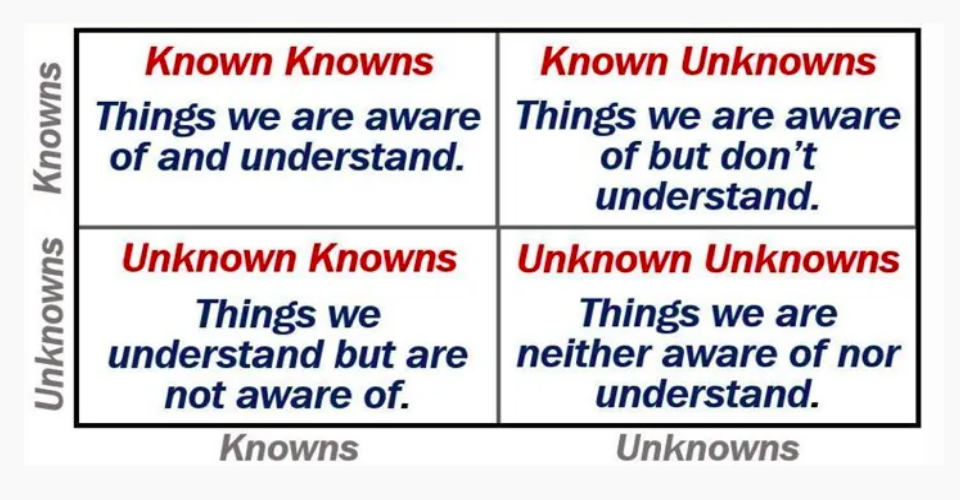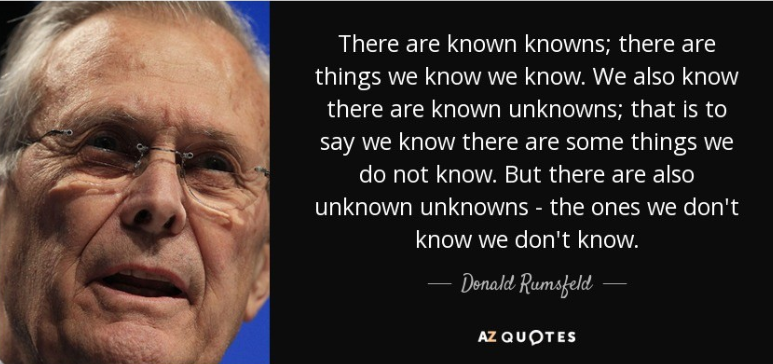Preparing for Uncertainty in Public Speaking

Known Knowns, Unknown Unknowns, and Known Unknowns
... there are
known knowns ; there are things we know we know. We also know there areknown unknowns ; that is to say we know there are some things we do not know. But there are alsounknown unknowns — the ones we don't know we don't know." - Donald Rumsfeld, 13th and 21st United States Secretary of Defense (January 20, 2001 – December 18, 2006 under President George W. Bush, and November 20, 1975 – January 20, 1977 under President Gerald Ford).
In a USA Department of Defense briefing on February 12,
While his choice of words IMHO was poor for a mass audience, the phraseology is a long established concept in project management and risk management circles, and even mirrors somewhat the Johari Window technique. Known unknowns refers to "risks you are aware of, such as canceled flights", whereas unknown unknowns are risks that come from situations that are so unexpected that they would not be considered.

The idea, though initially applied by Rumsfeld to national security, holds significant value in various fields, including public speaking. Understanding and preparing for these different types of knowledge can help presenters handle uncertainties and deliver more effective presentations.
Known Knowns: Things You're Aware of and Understand
In public speaking, "known knowns" are the elements you are fully aware of and understand thoroughly. These include the content of your presentation, your audience's demographics, and the logistics of the event. When preparing, it's crucial to have a deep understanding of your material. This includes knowing your key points, supporting data, and any visual aids you plan to use. Practicing your speech multiple times ensures you are comfortable with the flow and timing. Familiarity with your audience allows you to tailor your message to their interests and needs, enhancing engagement.
Known Unknowns: Things You're Aware of but Don't Understand
"Known unknowns" in public speaking refer to aspects you are aware of but don't fully understand. These might include potential questions from the audience, unexpected technical issues, or varying audience reactions. While you can't predict every question, you can anticipate possible queries and prepare thoughtful responses. If you're unsure about certain aspects of the venue's technology, arriving early to test equipment can help mitigate potential issues. Being aware of these uncertainties allows you to create contingency plans, reducing the risk of being caught off guard.
Unknown Knowns: Things You're Not Aware of but Understand
"Unknown knowns" are the elements you understand subconsciously but haven't brought to your conscious awareness. These could be your intuitive public speaking skills, such as natural body language, vocal tone, and pacing. You might not actively think about these aspects, but they play a significant role in how your message is received. Reflecting on past presentations can help you recognize these strengths. Bringing these "unknown knowns" to your conscious awareness allows you to leverage them more effectively, enhancing your overall delivery.
Unknown Unknowns: Things You're Neither Aware of nor Understand
The most challenging category is the "unknown unknowns" – the unforeseen events and reactions you cannot predict or prepare for. These might include an unexpected question that stumps you, a sudden change in audience composition, or a technical failure at a critical moment. While it's impossible to prepare for every unknown unknown, you can cultivate a mindset of flexibility and resilience. Developing strong improvisational skills and maintaining a calm demeanor under pressure will help you navigate these unexpected situations with grace.
Relating the Concepts to Public Speaking
Rumsfeld's framework can be a valuable tool for public speakers. By categorizing the different types of knowledge and uncertainty, you can better prepare for your presentations. Begin by solidifying your "known knowns" – ensure you are well-versed in your content and understand your audience. Next, identify your "known unknowns" and develop strategies to address them. Reflect on your "unknown knowns" to uncover hidden strengths that can enhance your delivery. Finally, acknowledge the existence of "unknown unknowns" and prepare mentally to handle surprises with composure.
Preparing for Known Knowns
Preparation for "known knowns" involves thorough research and practice. Develop a comprehensive understanding of your topic and rehearse your presentation multiple times. Familiarize yourself with your audience's background and tailor your message accordingly. Preparing detailed notes and practicing in front of a mirror or a small audience can help reinforce your confidence and clarity.
Addressing Known Unknowns
For "known unknowns," create a list of potential questions and scenarios you might encounter. Prepare responses and contingency plans for each. For instance, if you are uncertain about the technical setup, arrive early to test all equipment. Have backup plans, such as printed copies of your slides or a backup laptop, to ensure you can continue smoothly despite technical issues.
Leveraging Unknown Knowns
Reflect on past speaking experiences to identify your "unknown knowns." Pay attention to feedback from previous presentations and recognize patterns in your strengths. Maybe you have a knack for engaging storytelling or a natural ability to connect with the audience through humor. By bringing these strengths into your conscious awareness, you can intentionally incorporate them into your presentations.
Navigating Unknown Unknowns
Acknowledge that "unknown unknowns" are an inevitable part of public speaking. Develop a mindset of adaptability and resilience. Practice techniques for staying calm under pressure, such as deep breathing and positive self-talk. Remember, the audience is often empathetic and supportive. If an unexpected situation arises, stay composed, and handle it with grace. Your ability to manage these surprises can leave a lasting positive impression.
In conclusion, Donald Rumsfeld's concept of "known knowns, known unknowns, and unknown unknowns" offers a valuable framework for Public Speakers. By understanding and preparing for these different types of knowledge, you can enhance your confidence and effectiveness. Solidify your grasp on the "known knowns," develop strategies for "known unknowns," leverage your "unknown knowns," and cultivate resilience for "unknown unknowns." Embracing this holistic approach will empower you to navigate uncertainties and deliver impactful presentations.
